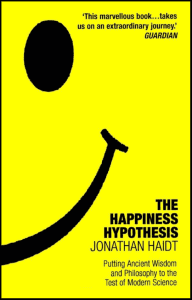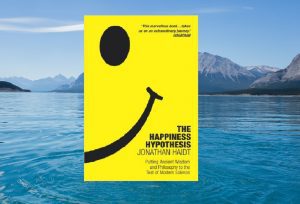This book delves into the mechanisms behind our emotions and the role they play in happiness. I found it to be an easy read with some fascinating insights.
I’m aware of the research into “things” being less value for money than “experiences”, but this goes further. The Law of Diminishing Returns states that the enjoyment of a possession decreases the longer you own it. In contrast, we tend to see experiences through rose-tinted glasses and remember more of the good parts. Happiness is a relative measure, think of it as a moving average of the last six or twelve months of your life. Someone paralysed in an accident will at some point be just as happy as they were prior to it, having accepted their new circumstances. However, certain things we never fully adapt to, like difficult relationships with family.
My notes aren’t too comprehensive, as I’ve read several other books on the subject and only write what’s new to me. You may come away with twice the information I gathered, in which case it’s an even more valuable read.
The Happiness Hypothesis by Jonathan Haidt

PRO TIP: Take notes! When you read a book, use a blank sheet of paper as a bookmark. Write down any interesting facts and information from the book. This condenses a whole book into 3-4 pages of key notes that are important and relevant to you.
My Notes
- In a moral argument, your emotional mind takes a position and your rational mind invents a reason for your position. This makes it hard to argue because you aren’t invested in your reason.
- As we feel losses more than gains, areas we worry excessively about will only get worse. For example, being careful with money can bring us great pleasure, but a speeding ticket is that much more painful to us
- Reciprocity in the animal kingdom is a zero-sum game where one has to lose out for the other to gain.
- Salesmen use reciprocity (free sample etc.) to trick us into donations/purchases. It’s in our instinct to want to give something in return, even if we found no value the initial exchange.
- Salesmen use concession (conceding) by using an inflated starting price. Not only will the customer settle on a higher number, they will be happier having done so.
- People over-estimate their contribution in group settings and their abilities compared to others. When asked to rate contributions on group projects at University, the total was around 140%.
- The research found that we accurately assess the skills and contributions of others but inflate our own.
- The Progress Principle: Joy is in the journey, the main emotion that follows accomplishment is relief.
- The Adaptation Principle: we react strongly only to a change in circumstance. A prolonged period will see us adjust our “benchmark” happiness to our new level. We might be happier with a promotion for 6-12 months, but after a few years we are no happier than before.
- Happiness Formula: H = S + C + V.
- H = Happiness Experienced
- S = Genetic predisposition or “set point”
- C = Conditions of your life e.g. race, sex, marital status, age
- V = Voluntary activities, such as exercise, meditation, playing a musical instrument
Happiness Variables
There are certain “Happiness Variables” for which you never fully adapt. These will always cause you some stress or diminished happiness. These are:
- Noise: living somewhere noisy e.g. near a pedestrian crossing that beeps constantly, provides stress you never adapt to.
- Commuting: long commutes in traffic should be avoided long term
- Control: a lack of control over your life is endlessly stressful
- Shame: those embarrassed about something daily feel worse e.g. body image
- Relationships: a positive relationship is one of the best determinants of happiness, but sour relationships cause terrible friction
- People who seek money, fame and beauty are less happy on average
- A study found the highest reported happiness was during a “flow state”. A flow state is when a person is doing something challenging but well matched to their ability level.
- Passionate love is fleeting (honeymoon phase) while compassionate love grows steadily.
- Suicide rates increase the fewer obligations and attachments someone has in life. Social relationships are very important for mental health and well being.
- When people increased volunteer work all measures of happiness and well being increased. This lasted for as long as they continued volunteering.
Your work falls into one of three categories:
- Job: You clock watch, purely do it for pay, and your fulfilment comes from what you do outside of work.
- Career: You see progression, sometimes question the ‘rat race’ but still work for promotions.
- Calling: You enjoy your work, if you won the lottery and didn’t HAVE to do anything for money you would still do this activity.
As I say, my notes aren’t as comprehensive as they may have been if I read this book a year ago. This is a great book for understanding human behaviour, both your own and of others. If the subject matter is something that interests you then I think you’ll gain a lot from adding this to your reading list.

